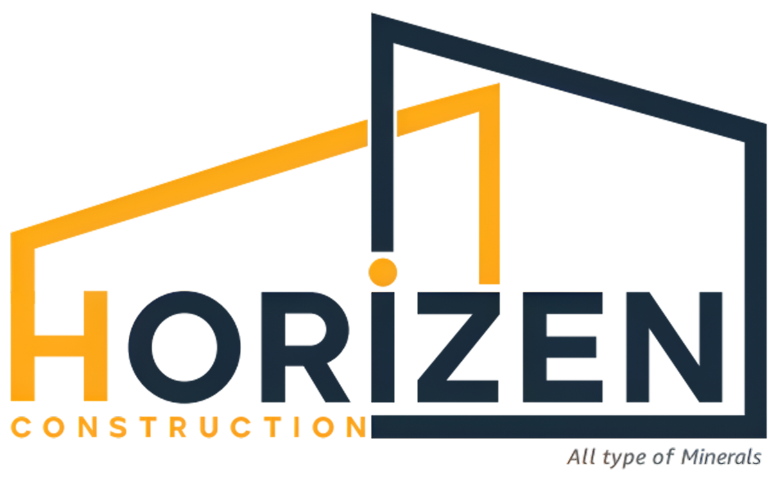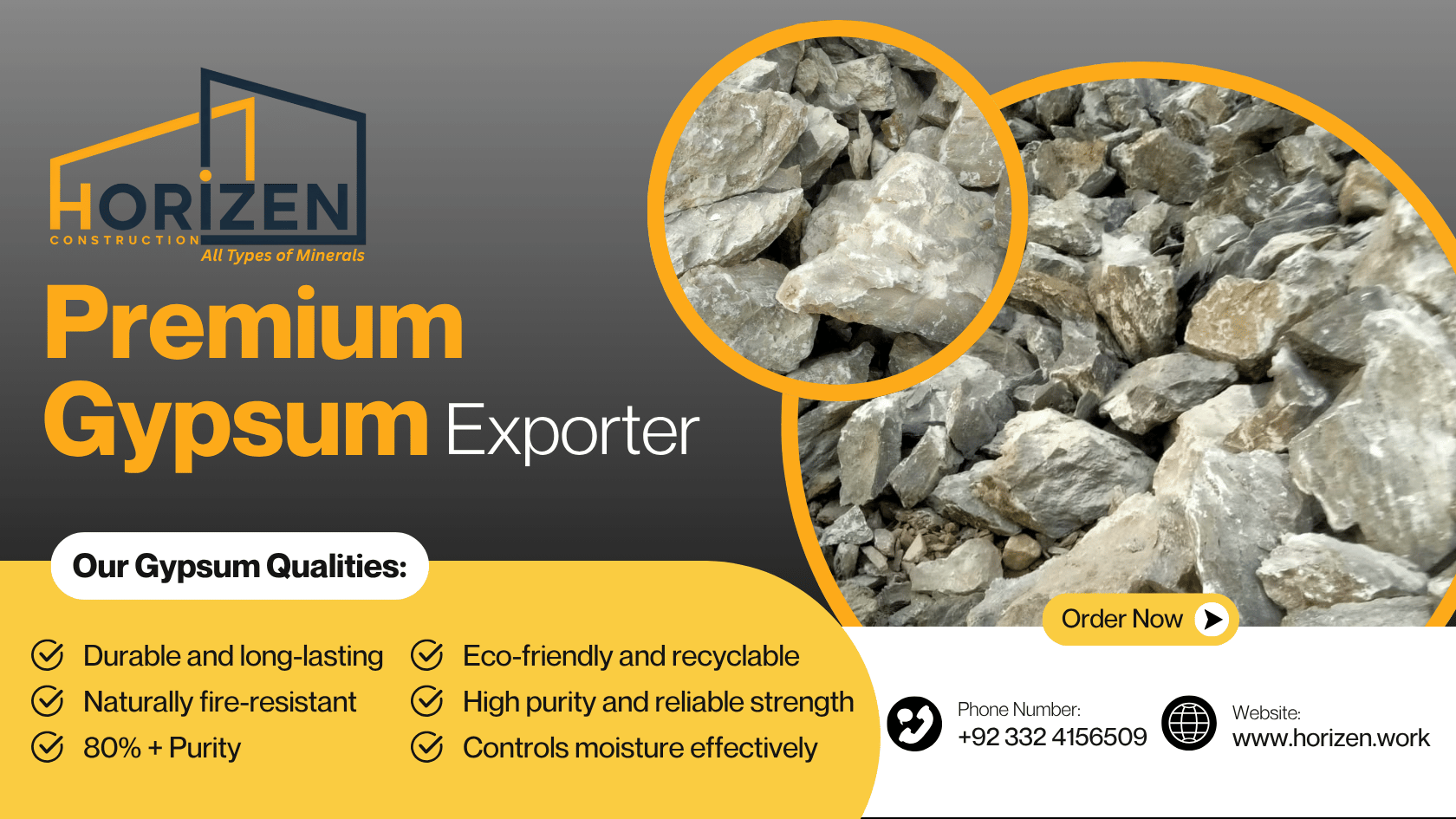High-Quality Gypsum Supply by Horizen C. – Trusted Worldwide Mineral Exporters
Introduction: A Mineral that Shapes the World
Minerals form the backbone of global industries — from construction and agriculture to manufacturing and technology. Among them, Gypsum holds a special place due to its versatility, abundance, and diverse applications. At Horizen.Work, we are proud to be one of the leading international suppliers and exporters of premium-quality Gypsum and other industrial minerals across the globe.
Our mission is simple — to deliver natural minerals that power industries and sustain global growth. Whether it’s for construction, agriculture, cement, or decorative purposes, our Gypsum products meet the highest international quality standards and are trusted by clients in Asia, the Middle East, Africa, and Europe.
What Is Gypsum? — A Natural Wonder
Gypsum is a soft sulfate mineral composed of calcium sulfate dihydrate (CaSO₄·2H₂O). It naturally forms through the evaporation of seawater and saline lakes, leaving behind layered deposits that are mined and processed for various applications.
Gypsum is one of the oldest building materials known to humanity. Historical evidence shows that ancient Egyptians used it in constructing the Great Pyramids of Giza, proving its durability and reliability even thousands of years ago.
Today, this mineral continues to play a crucial role in construction, agriculture, and manufacturing, providing the world with a material that is eco-friendly, cost-effective, and multi-functional.
Physical and Chemical Properties of Gypsum
Understanding the characteristics of Gypsum is key to appreciating its versatility. Below are some defining properties that make Gypsum one of the most useful industrial minerals:
| Property | Details |
|---|---|
| Chemical Formula | CaSO₄·2H₂O |
| Color | White, grey, or colorless (sometimes tinted due to impurities) |
| Hardness (Mohs Scale) | 1.5 – 2 (soft and easily workable) |
| Specific Gravity | 2.3 |
| Luster | Silky to pearly |
| Solubility | Slightly soluble in water |
| Cleavage | Perfect in one direction |
| Structure | Monoclinic crystalline system |
These properties make Gypsum ideal for molding, mixing, and combining with other materials — a reason it’s widely used in cement production, plasters, fertilizers, and artworks.
Types of Gypsum and Their Industrial Uses
At Horizen.Work, we supply all grades and forms of Gypsum tailored to meet the needs of various industries. Each form of Gypsum has unique applications:
1. Raw Gypsum Rock
This is the natural, unprocessed form of Gypsum extracted from mines.
Uses:
- Cement production as a setting time regulator.
- Agriculture as a soil conditioner.
- Industrial processing for manufacturing gypsum powder.
2. Gypsum Powder
Produced by heating raw gypsum at controlled temperatures, removing part of the water content.
Uses:
- In construction, it forms the base for plaster, drywall, and wall finishes.
- Used in agriculture to enhance soil fertility.
- Essential for ceramic molds, paints, and paper manufacturing.
3. Plaster of Paris (POP)
Formed by heating gypsum at 150°C, POP is a fine white powder that hardens when mixed with water.
Uses:
- Interior design (false ceilings, wall decor, cornices).
- Medical casts for fractures.
- Molding and sculptures in art and architecture.
4. Gypsum Boards / Drywall
One of the most popular modern building materials made from pressed gypsum layers between paper sheets.
Uses:
- Interior walls and ceilings.
- Soundproof and fire-resistant partition systems.
- Quick and cost-effective construction alternative to bricks.
5. Agricultural Gypsum
Crushed and ground to fine particles, this form improves soil health.
Uses:
- Reduces soil compaction and salinity.
- Improves water infiltration and root growth.
- Adds calcium and sulfur nutrients to crops.
Industrial Applications of Gypsum
Gypsum’s adaptability makes it indispensable across numerous industries:
1. Construction and Architecture
Gypsum is the backbone of the construction industry. It’s used to make:
- Cement (regulates setting time).
- Plasterboards and wall panels.
- POP ceilings and decorative moldings.
- Fire-resistant coatings in buildings.
Its non-combustible nature makes it perfect for interior walls and ceilings that demand safety and beauty.
2. Agriculture and Soil Management
Gypsum enriches the soil by adding calcium and sulfur, vital elements for plant growth.
It also:
- Improves soil structure and aeration.
- Prevents soil crusting and water runoff.
- Reclaims sodic (saline) soils.
- Helps crops absorb essential nutrients.
Farmers worldwide use gypsum as a natural soil amendment to improve productivity and sustainability.
3. Cement Manufacturing
In cement plants, a small amount of gypsum (about 5%) is added during the final grinding process.
This controls the setting time of cement and enhances its strength, ensuring that concrete structures are durable and stable.
4. Industrial Applications
Gypsum finds use in several industrial sectors:
- Paper and textile industries for finishing.
- Pharmaceuticals as an ingredient in tablets.
- Food industry (E516) as a calcium additive or stabilizer.
- Plastics and paints as filler material.
5. Art, Design, and Molding
Due to its softness and easy shaping, gypsum is used for:
- Sculptures, molds, and castings.
- Decorative ceilings and wall panels.
- Museum replicas and architectural details.
Environmental and Sustainable Benefits of Gypsum
At a time when sustainability matters more than ever, Gypsum stands out as an eco-friendly mineral.
- 100% Recyclable: Gypsum can be reused indefinitely without losing its chemical properties.
- Natural and Non-Toxic: Safe for humans, animals, and the environment.
- Reduces CO₂ Emissions: Its use in construction minimizes the need for energy-intensive materials.
- Soil Conservation: Enhances soil health naturally without chemical harm.
At Horizen.Work, we promote sustainable mining and supply practices — ensuring minimal environmental impact while maximizing resource efficiency.
Quality Control and Global Export Standards at Horizen.Work
As a global mineral supplier, Horizen.Work is committed to quality, consistency, and customer satisfaction. Our Gypsum supply process follows strict international standards at every stage:
1. Sourcing and Mining
We source Gypsum from certified mines known for their high-purity deposits.
Each batch undergoes chemical composition testing to ensure optimum calcium and sulfate levels.
2. Processing and Grading
After extraction, the Gypsum is:
- Crushed and screened to desired sizes.
- Processed into powder or other forms.
- Graded according to industry use (agricultural, industrial, or construction quality).
3. Packaging and Logistics
We offer customized packaging options (bulk bags, containers, pallets) based on client requirements.
Our logistics network ensures timely and secure delivery across the world.
4. Export Compliance
We strictly adhere to international export regulations and provide all certifications, testing reports, and material safety data sheets (MSDS) to our clients.
Why Choose Horizen.Work as Your Gypsum Supplier
Choosing the right mineral supplier makes all the difference in production efficiency and product quality. Here’s why industries worldwide trust Horizen.Work:
- 🌍 Global Network: We serve clients in Asia, Europe, Africa, and the Middle East.
- 🧪 High Purity Materials: Guaranteed >90% purity Gypsum for industrial and construction use.
- ⚙️ Custom Solutions: Different grades and particle sizes to suit every application.
- 🕒 Reliable Supply Chain: Fast delivery and consistent availability.
- ♻️ Sustainability Commitment: Ethical sourcing and environmentally responsible operations.
- 💬 Dedicated Support: Professional guidance for bulk orders and logistics coordination.
The Future of Gypsum in Industry
The global demand for Gypsum is projected to rise steadily over the next decade, driven by rapid urbanization, agricultural modernization, and infrastructure growth.
As industries focus on sustainable materials, Gypsum will continue to play a vital role in green construction and eco-friendly agriculture.
At Horizen.Work, we are constantly expanding our capacity and partnerships to meet this growing demand — ensuring that our clients always receive the best minerals at the most competitive prices.


Leave a Reply